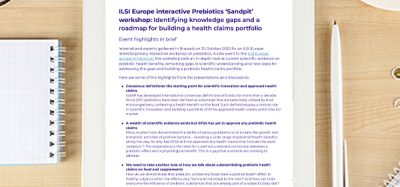More action needed to protect those with food allergies
- Like
- Digg
- Del
- Tumblr
- VKontakte
- Buffer
- Love This
- Odnoklassniki
- Meneame
- Blogger
- Amazon
- Yahoo Mail
- Gmail
- AOL
- Newsvine
- HackerNews
- Evernote
- MySpace
- Mail.ru
- Viadeo
- Line
- Comments
- Yummly
- SMS
- Viber
- Telegram
- Subscribe
- Skype
- Facebook Messenger
- Kakao
- LiveJournal
- Yammer
- Edgar
- Fintel
- Mix
- Instapaper
- Copy Link
Posted: 27 April 2016 | Victoria White, Digital Content Producer | No comments yet
More action needs to be taken in order to better protect people with food allergies, according to a report from a team of food safety experts…


More action needs to be taken in order to better protect people with food allergies, according to a report from a team of food safety experts.


The team includes Professor Chris Elliott from Queen’s University Belfast, who led the recent independent review of the UK’s food system.
The report outlines a strategy to close the gaps in current processes for detecting and measuring allergens.
Food allergy is a rapidly growing problem in the developed world, affecting up to 10 percent of children and 2-3 percent of adults. Allergic reactions can range from a mild runny nose, skin irritation or stomach upset to severe anaphylaxis, which can be fatal.
Food allergies have significant impact on quality of life and usually require lifelong avoidance of the offending foods. There are also burdens on health care, the food industry and regulators.
Professor Elliott and Professor Duncan Burns, Emeritus Professor at Queen’s Institute for Global Food Security, are among a team of experts led by Michael Walker from the Government Chemist Programme at LGC, which has outlined a ‘grand vision’ to address the key challenges in allergen measurement and analysis. They make a series of recommendations primarily addressed to the European Commission’s Health and Food Safety Directorate, DG Santé, aimed at securing a food chain which is reliable, resistant to fraud and ultimately safe for consumers.


Professor Chris Elliott
Fraud involving food allergens
Professor Elliott is a world-renowned expert on food fraud and traceability. He commented: “The food supply chain is highly vulnerable to fraud involving food allergens, risking consumer health and reputational damage to the food industry. Cross-contamination during production, processing and transport is also a problem. While efforts have been made to improve food labelling and introduce the concept of threshold quantities for allergens, these depend on being able to accurately detect and quantify allergens in the first instance. Gaps in the current system mean that it is difficult to achieve this.
“This paper sets out a strategy to address those gaps and calls on the EC to take action in three particular areas. Firstly, the use of bioinformatics studies for modelling how best to predict what allergens present in foods, and specifically what quantities of these allergens, will adversely affect the health of someone with food allergies. Secondly, the development of reference methods which will provide a ‘gold standard’ for the detection and measurement of allergens in food. And thirdly, the production of reference materials which can support threshold decisions –samples of foods with known, controlled amounts of allergens present, to allow for checks on the accuracy of allergen testing methods.”
Significant international effort and an inter-disciplinary approach will be required to achieve these aims and protect those at risk of food allergies. Michael Walker from LCG said: “If we fail to realise the promise of future risk management of food allergens through lack of the ability to measure food allergens properly, the analytical community will have failed a significant societal challenge. Our recommendations are complex with associated resource demand but rarely has such an exciting interdisciplinary scientific endeavour arisen as a solution to a key socially relevant problem.”





